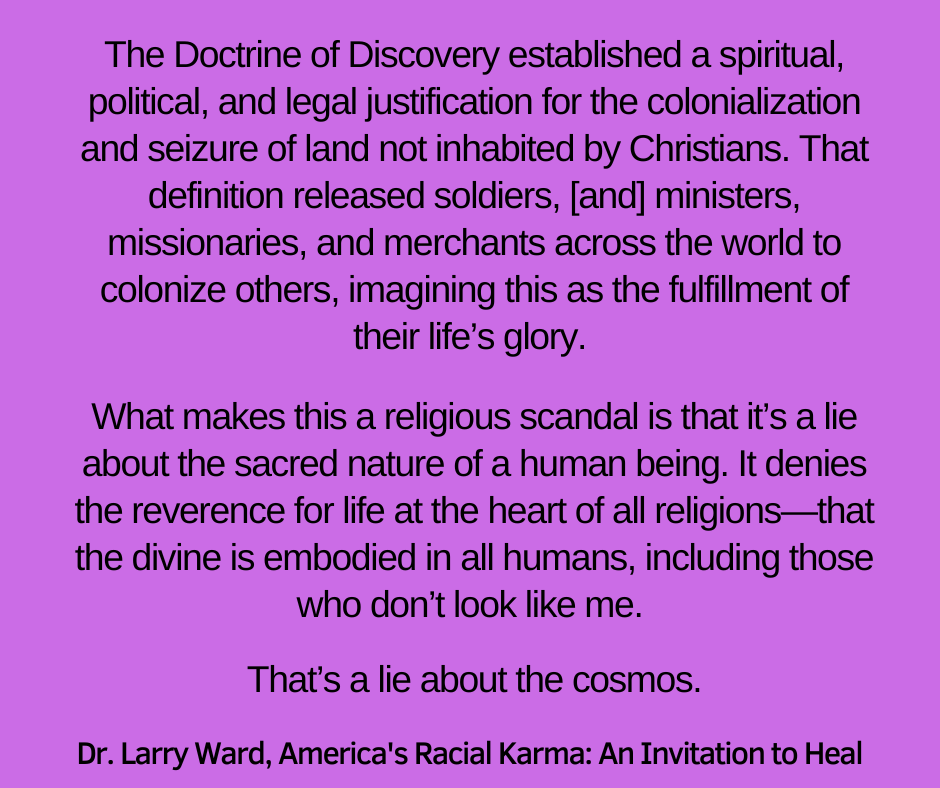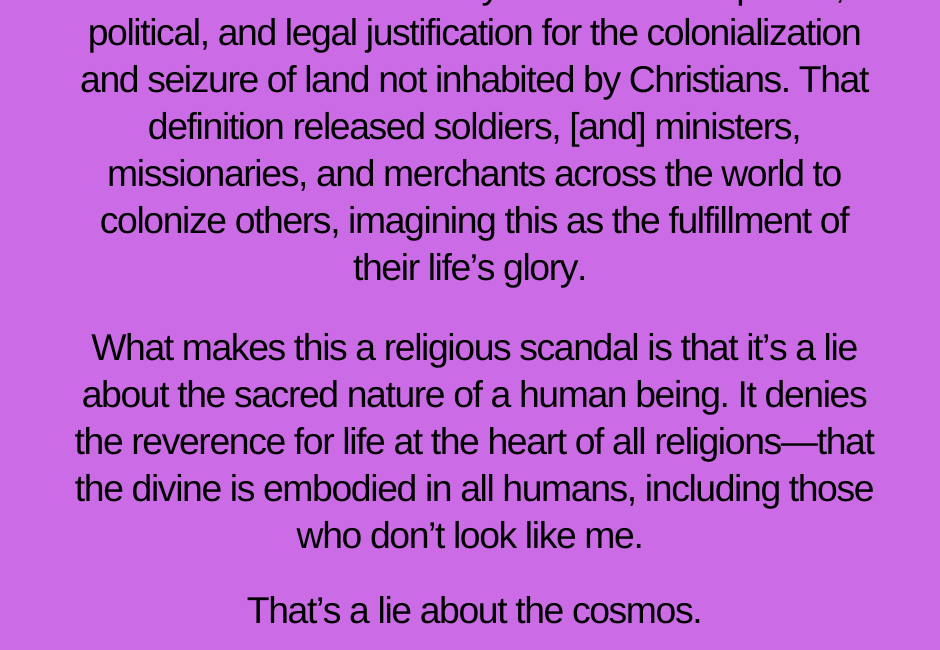October 9, 2022
The Unitarian Society, East Brunswick, NJ

One definition for what it means to “decolonize” is to reverse the harms created by Settler Colonialism.
Before we go deeper into what it means to decolonize, let’s spend a little time on that last phrase: Settler Colonialism.
As it relates specifically to the indigenous peoples of this continent, Settler Colonialism is “the removal and erasure of indigenous peoples in order to take the land for use by settler in perpetuity.” And while that sounds like a thing of the past, it is not. Not as long as we live on land appropriated from indigenous peoples through acts of genocide. Not as long as the presence of indigenous peoples and influences is erased. Not as long as there is false or incomplete information about contemporary Native peoples, or even historical ones.[1]
Settler Colonialism is the heritage of everyone who lives on this continent now, even if your ancestors were not here at the time at the time of the Trail of Tears or the time of the 15th European explorers or at the time the Mayflower landed on so-called Plymouth Rock.
The legacy of Settler Colonialism is, as our reading named earlier, “a religious scandal.” This is so because the Catholic Church, in 1493, issued a papal bull that instructed that
“in our times especially the Catholic faith and the Christian religion be exalted and be everywhere increased and spread, that the health of souls be cared for and that barbarous nations be overthrown and brought to the faith itself.”
It was these words, from Pope Alexander, that formed the basis of the Doctrine of Discovery, which basically gave religious carte blanche for the European takeover of everything in the Western hemisphere, as well as for Christian missionaries to practice brutality in the name of civilizing the so-called heathen. It linked exploration and colonization to Christianity and conversion.
This is why it is a religious scandal. And not just one that belongs to the Catholics. For it was not only Catholic countries that hid their greed in the Doctrine of Discovery. It was not only Catholics who built residential schools that tore apart Native families in Canada and in the United States. As I preached last November, the Unitarians ran two such residential schools, separating children, replacing indigenous names with Anglicized ones, teaching morality. This is our religious scandal too.
This past summer, Pope Frances continued the Catholic Church’s contemporary reckoning with this aspect of their past. He traveled to Canada and spoke an apology to the First Nations people there. In the crowd, a voice rose and could be heard calling for him to repudiate the Doctrine of Discovery. That voice belonged to chief of the Neskonlith Indian Band in British Columbia, Judy Wilson[2].
The process and practice to decolonize is a continuum. It’s got to start somewhere. Recognition of harm coupled with an apology is somewhere on the continuum, but it’s in the middle. It’s not where the Catholics should finish.
I wonder where we are on that continuum? I wonder where we can go?
~~~
My white colleague, Rev. Dr. Carl Gregg, who serves our Unitarian Universalist congregation in Frederick, Maryland, has preached multiple times on this topic. He states that there are at least two meanings of the practice to decolonize:
“First, it can mean literally undoing colonization, which at its most basic level would require giving land back to the first indigenous groups to the greatest extent possible.
Second, decolonization can mean the process of increasingly centering indigenous peoples and perspectives, indigenous wisdom and knowledge, and indigenous ways of being in the world”
https://www.frederickuu.org/sermons/211010ReimaginationDecolonization.pdf
There is a land back movement. There are a handful examples of religious organizations giving land back to Native communities in their midst. One comes from 2019, when the United Methodist Church gave land back to the Wyandotte Nation of Oklahoma. That’s a powerful thing that has a real impact.
If we start with #landback, we ~ this congregation in its current make-up ~ won’t get very far. So, while that doesn’t mean we dismiss the #landback movement outright, it means it is not the strategy we start with. We can say yes to decolonizing, yet start elsewhere, because we see the process of decolonization as a continuum. On such a continuum, progress is measured in acts of ever-increasing solidarity.
Still, we must be wary of shallow or hollow efforts on our parts, done only to make ourselves feel better, but which do not lead to true acts of solidarity and don’t even expand our own comfort zones. For instance, though we have spoken land acknowledgements on several occasions in the past few years, this Sunday service does not include one. Given our lack of sustained engagement or relationship with an indigenous partner, I worry that a land acknowledgement is just for show, just to make us feel better, rather than moving us towards solidarity.
That second meaning of decolonization ~ “the process of increasingly centering indigenous peoples and perspectives, indigenous wisdom and knowledge, and indigenous ways of being in the world” ~ is what infused the introduction I gave to our first hymn.
To have the courage to decolonize asks us to center the experience and perspective of indigenous people.
And if we were to choose to go deeper, by which I mean, apply the lens of the 8th Principle, which asks us to dismantle oppressions in accountable ways, then the courage to decolonize asks us to do so accountably to and in relationship with indigenous communities.
While we choose to give a local indigenous community funds as our Be the Change recipient, this is not relationship of accountability or mutuality. It could lead us there, but in fact, our efforts have fallen short when it comes to developing relationships with the Ramapough Lenape in Mahwah. While disappointing, it just may not be in our cards to be able to follow through on such a thing. Ultimately that has to be okay, even if it has consequences, as all decisions have. I believe that for every sacred no, space is allowed for some other sacred yes.
So then, what can it mean for us to practice decolonization? For us as individuals? For us as a congregation?
Could it mean that we commit to learning more about these three concepts – decolonization and Settler Colonialism and Doctrine of Discovery? Perhaps if the Social Justice Team can commit to a month of including resources and articles about this in the Weekly Tea that is in every eblast, each of us could commit to reading them all? Reading two? At least one? November is Native American Heritage month, so the timing is good.
I have been paying attention to integrating more indigenous perspectives in the sources I use to create worship and write sermons. Robin Wall Kimmerer and Joy Harjo are favorites. No doubt, there are more indigenous artists whose work can blow my mind and expand my heart.
When learning about Native Americans, we can give more weight to those sources with indigenous identities, being careful to avoid learning through the “white gaze.” Be particularly cautious about those people who claim Indian ancestry based not on community or relationship, but a report from 23&Me. Currently, there’s a new wave of Native American comedies, written and created by Native peoples. In so doing, they are taking back their narratives. We can commit to being a part of an appreciative audience of these shows.
In 2019-20, the UUA’s CommonRead for that year was An Indigenous Peoples’ History of the United States by Roxanne Dunbar-Ortiz, published by the UUA’s own Beacon Press. Perhaps the Anti-Racism book group will take this on after the current book, which is Robin diAngelo’s Nice Racism: How Progressive White People Perpetuate Racial Harm. (As of the most recent eblast, they were still open to interested people joining this online book group – please get in touch with Jackie Held-Rubin if you would like to take part.)
Does it mean we choose to no longer sing the hymn, “We’ll Build a Land?” Does it mean that we sing it, but with a real commitment to frame it informed by indigenous perspectives? With a commitment to change to the lyrics to reflect a decolonizing intent? Like I took us through in the introduction to the hymn I offered earlier in today’s service.
Perhaps we have a hymnal correction party where we change the lyrics to “We’ll Build a Land,” alongside the hymn we now call, “Answering the Call to Love,” about which you will hear more next week.
In 2012, ten years ago at General Assembly, we Unitarian Universalist voted to repudiate the Doctrine of Discovery. I was at that GA, with my younger daughter. It was a proud moment among many at that GA. While the whole resolution is too long to quote here, a key paragraph resolves that
we, the delegates of the 2012 General Assembly of the Unitarian Universalist Association, repudiate the Doctrine of Discovery as a relic of colonialism, feudalism, and religious, cultural, and racial biases having no place in the modern-day treatment of indigenous peoples;
Repudiation is good – we did it before the Pope, though that’s no surprise. But it’s not enough. Decolonization is an ongoing process of spiritual growth – no static satisfaction – wherein we do what we can and do what we must to abolish in our laws, in our culture, and in our hearts the Doctrine of Discovery, for, as Dr. Larry Ward said, “it’s a lie about the sacred nature of a human being. It denies the reverence for life at the heart of all religions.”
Let us be not liars about the cosmos, but truth tellers, affirming “the divine is embodied in all humans, including those who don’t look like me.”
Let us, as the poet Joy Harjo instructed, “help the next person find their way through the dark.”
So be it. See to it. Amen.
[1] https://www.learningforjustice.org/magazine/what-is-settlercolonialism
[2] https://www.cbc.ca/radio/asithappens/as-it-happens-the-tuesday-edition-1.6532503/pope-faces-calls-to-renounce-the-doctrine-of-discovery-at-the-heart-of-colonialism-1.6532787
